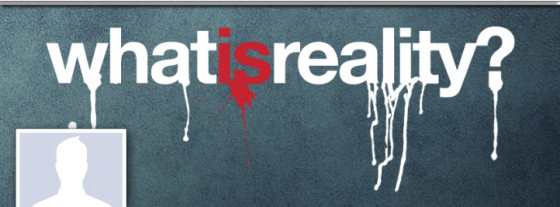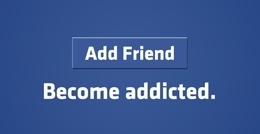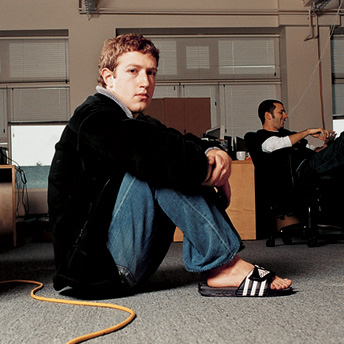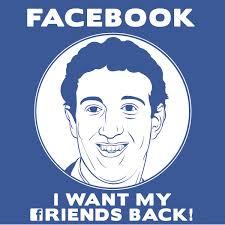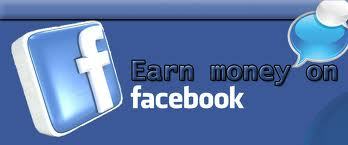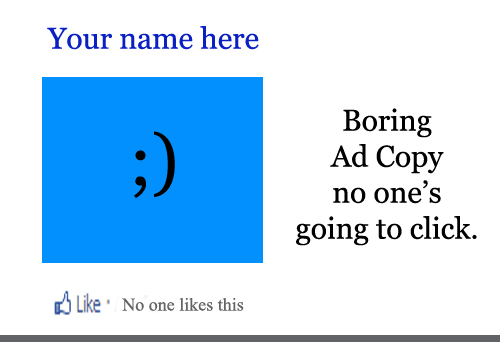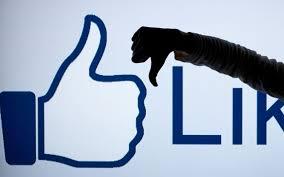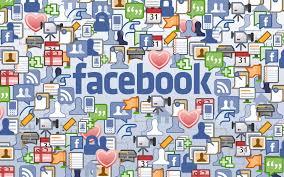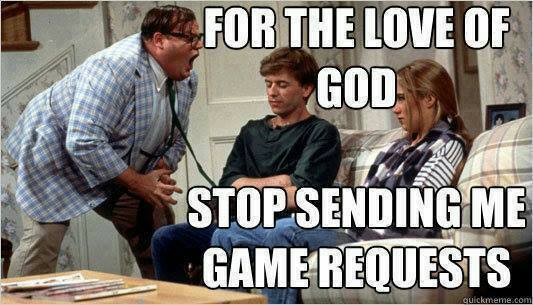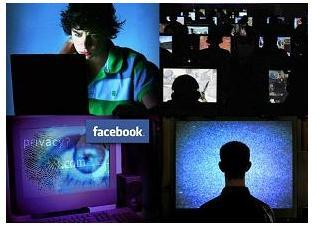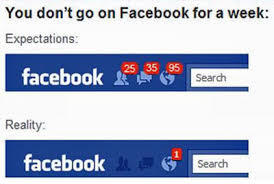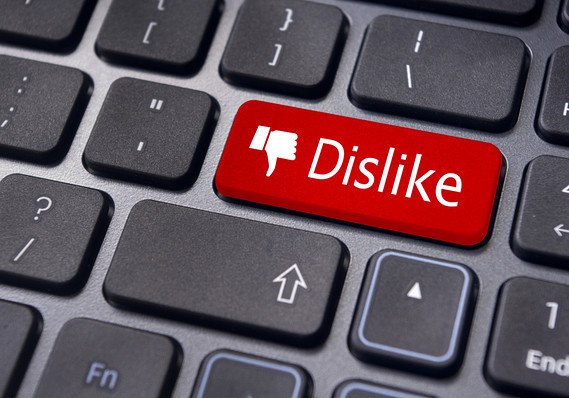
It's not real, you know?
And it certainly isn't productive.
Facebook isn't real or productive, it's just an advanced version of the electronic bulletin boards that have been around since the Internet dawned. Nobody on those old boards met their 'soul-mate' or bought a car; or paid their bills; or broadcasted their political opinions; or flamed each other for disagreeing. Facebook (FB) doesn't really 'bring people together' in any traditional sense of the phrase but drives them apart as I will try to prove in this column.
A real 'social network' wouldn't be virtual. It would involve real people, meeting in a real, tangible, bricks-and-mortar building or outdoor place, where they might have food, drinks and conversation. That would be real. What's not real is an online place where there's no exclusivity or discernment about who gets in, and all manner of riff-raff voicing their opinions, exchanging links to news reports, photos of kittens playing with string, comic books and jokes, while espousing how great it all is that they're meeting and making so many "friends."
"It's the greatest time-waster in the history of human civilization," says one automaton to the other, "I don't judge you ... or your Vicodin addiction."
Because of all the potential recoiling horror of those irreversibly caught in the FB clutches, this will not be a short, pithy or concise column. I feel the need to completely and totally explain my experiences with FB so that as mad as these FB idolizers may be with me--and I expect the FB bullies to come out flaming--there will be some chance they will understand.
Full disclosure: I freely admit in advance that FB is addictive. (And that worries me.)
Facebook has turned into (if it wasn't from the beginning) a humongous waste of time and productivity as all those legions of people are glued to their back-lit screens of all descriptions, typing madly, when they could and should be doing something productive--meaning having some value. Or as productive is further defined. "having the quality or power of producing especially in abundance; effective in yielding results, benefits, or profits." When I use the word "productive" here, this is what I'll be referring to and hoping for.
There's reading a book for instance (or, reading online to educate oneself). Or doing a crossword puzzle/Sudoku (not my thing but it is some people's). Play chess. Improve your resume. Learn a new language. Teach your child how to ride a bike. Talk to your mom and dad. Surprise your wife. Go to church. Volunteer at a local soup kitchen. You get the point--there's SO MUCH more to do in real life, the real world than destroy your brain cells with fleeting FB chatter and fake friends.
As I ramble on, some of you will undoubtedly be saying to yourselves, "But I DO learn things and meet interesting new people and accomplish things on FB." Balderdash, I say. Let me repeat: It's not real. It's 'virtual.' When FB starts becoming like LinkedIn and people start finding jobs, building businesses, putting food on the table and improving themselves on FB, then I'll consider this argument. (Subtext: It isn't like this now and I don't think it ever will be.)
Admittedly, I'm 'old school.' But unlike my generation who truly knew much more about technology than our parents; my daughter doesn't know more about technology than I do because I've made it my living over the last four decades and she hasn't even been alive for that period of time. So I generally know what I'm talking about when it comes to much of technology and the Internet.
I was an 'early adopter' of FB. After meeting Mark Zuckerberg circa 2006--when he wasn't the Mark Zuckerberg yet, just a shy kid who was clearly interested in girls--I checked out his nascent site in early 2007. I wasn't impressed.
As many of us know, FB's entire value proposition was originally built on Zuckerberg and his college friends surfing girls' pictures for lascivious opportunity. Not my thing but I looked at FB as a kind of gigantic, unregulated, free Match.com. FB seemed to be a Costco of women's pictures and that's all. Not for me. Only in the following years would FB radically morph into a 'social media network' that took over the world.
I'm big on the reasoning behind why entrepreneurs create the businesses they do; what caused it and was that helpful to others? Now if Zuckerberg had created FB to bring a fragmented world together and help people instead of helping incorrigible geeks find girls, he'd really have something.
Before I get into the really annoying aspects of FB that don't address my claim of its lack of productivity, let me hit the idea with a tremendous whack that FB is totally and unequivocally unproductive. The vast majority of large corporations at least frown upon, if not completely deny firewall access for their employees to FB. And why shouldn't they? If you owned your own business, would you want to round a cubicle corner and find one of your highly-paid employees engaging in electronic dialogue with their old high-school friend on FB? Of course not.
The best example of how corporations feel FB threatens the productivity of their employees is Goldman Sachs. In January of 2011, the investment banking giant was so "dazzled" by FB's popularity, that they invested $450 million in it. Goldman's investment was a sly way to do an end-run around SEC regulations and obtain shares in the hot, potential-IPO stock and distribute it internally to partners and a few favored clients. Ugh.
However, the really interesting thing is, while investing so much of their money into FB, Goldman Sachs was preventing their entire workforce from accessing FACEBOOK. Seems hypocritical and arbitrary, to say the least. But Goldman apparently didn't mind treating their employees like peons because after all, they couldn't have everyone taking 661 page-views per month on Facebook. So I believe that this adequately makes my point about a general lack of productivity on FB, with the kind help and strong endorsement of Goldman Sachs.
Even Mark Cuban has called FB a "time suck."
Now, the "Network Effect" is fascinating to me; particularly how FB is trying to use it to 'lock-in' FB users. It's clear that FB is a strong believer in the Network Effect and of course, wants to lock us all into their FB platform, never to go anywhere else or use anything else.
I believe that the theory that "the value of a product or service is dependent on the number of others using it" is most certainly true in hard corps technology like servers and routers but completely wrong-headed when it comes to something like the FB social network. With a 'social' network, I strongly believe that the number of users in a network like FB's (1 billion) makes it more difficult to meet someone new with similar ideas and tastes and therefore, makes it unproductive. The countervailing theory I believe comes into play is the "signal-to-noise ratio." This radio/electronics principle, wonderfully translates from radio electronics to an environment such as FB because inversely to FB's beloved Network Effect, this says essentially, that the more people are inside a network, the harder it is to navigate and find the right people and get anything accomplished. One billion people is just too many.
It's time to list some of my observations on the absurdities of FB and the ways in which it can harm the human personality and quash productivity:
- "Facebook allows me to meet new people and reconnect with old ones." Let us investigate this frequent comment by dissecting it into two equal parts.
Number one would be the "meet new people" part. I argue that few people have, rarely if ever met a 'new' person on FB because usually you don't ever physically meet anyone who is new to you on FB. If you do, disappointment generally reigns. One of my FB friends--whom I've met in person--has 7,500 'friends' on FB. When I asked him how many he had met in person, there was a long silence, then he stuttered, "I don't know, maybe 40. Most of whom I already knew." Case closed. (Now, does this mean that nobody has ever met the love of their life or a eventual business partner on FB? Of course not; but it certainly is not the norm.)
And a strong case could be made that once you expose your real-world friends to other FB friends, you quickly lose them to string-playing kittens.
Number two, "reconnect with old ones." This is the big joke on FB and around the Internet. The frequency with which people find old friends, are immediately excited (or not) and then experience the cratering disappointment that they absolutely cannot tolerate this person any further is positively mythological. Nuff said.
- "But I get so much of my news from FB, have learned so much and have discovered so many new things there." Really? This is pathetic. And dangerous. Don't you see that the more FB sucks you into the little world they've created especially for you, the more you will go exclusively there for your news and information--the more they can begin to control your thoughts and further indoctrinate you into their revenue-streams. Who is FB's "Minister of Propaganda," I wonder. Two words: Not Good.
- The Youthful Users (Advertisers and online marketers pay attention here, this is, more often than not, your 'target audience'). I do a lot of talking to people. People I come across and cross paths with are, to me, micro-opportunities to learn. Sitting in a Panera Bread recently and working, sitting right across from me was a booth crammed full of early high school girls, 14 or 15 is my best guess, just out of class for the day. They were chatting wildly, of course and all had their smartphones out punctuating their frantic conversations with texting or Googling things. They were infecting the entire restaurant with their fun energy as young girls do. I thought, "What a great time to do a little market research." I approached their table and said, "Ladies, do you mind if I ask you a few questions about your technology?" From the looks on their faces, I'm sure they thought I was some stiff, old, fuddy-duddy who didn't know about anything newer than an IBM Selectric typewriter. One girl's face lit up and she said, "Sure" and the rest of them followed suit enthusiastically.
After warming them up with some talk about the iPhones versus Androids they used (the market IS radically tilting toward Android smartphones currently), I asked them about their 'social media use' and Facebook. A few of them screwed up their faces when FB was mentioned and the ones that didn't were clearly blase. "What? Instagram is your new thing?" I offered up. One said, "Definitely Instagram," with a few others chiming in agreement while another said, "No, for me it's Vine now." Then, finally, they all agreed. Vine was it.
Now, I was just glad there was an alternative to FB and Instagram for these young ladies because FB famously paid $1 billion for Instagram (a company with little revenue or profits) and it's a good thing they did so they could retain some of the enormous number of young people jumping ship from FB to Instagram. But when they showed me Vine, I saw the reason why. Vine is tremendous, I think. Short six-second vids are immediately activated when you scroll down to them on your screen; no annoying arrow to hit and buffering period where you are tapping your fingers, waiting ... they just play. And it is this small development, this apparently small, almost insignificant, added capability which makes it possible to go through and laugh at so many Vines instead of practically living on YouTube for the same amount of laughter. Great, now FB is going to have to buy Vine.
To add coal to my fire about FB being in trouble, a recent Princeton study comparing FB to MySpace (who?) says that FB will lose 80% of their users by 2017.
The point of this thread is that youth are fickle, as marketers have been saying for time immemorial. They see something shiny passing by at a high rate of speed and they go for it. And it appears to me as if kids are jumping the FB ship, leaving the sad, older demographic there, trying to keep an eye on them and meeting "old" high-school friends. How lame is that?
- As anybody knows, there is an infinite sea of posters to FB who chronically post things such as kittens playing with string, all forms of lovable animals/pets, Marxist doctrine, Bible scripture and the omnipresent uplifting, inspiring stories of human triumph. Now I enjoy and need these things occasionally and of course they can sometimes make me smile or feel better. But c'mon. And it is dripping with irony how nasty these same sweet-posters can become should you disagree with them (more on that later). It's clear that many of these animal-lovers, hate us human beings.
- These poor, insufferable FB regulars who need to get a life: So these people, constantly over-posting, who regularly clog up our news-feeds with all their content, need to be given something else to do. Like get a job or find another social network on which to post all their stuff nobody wants to read. Sorry, but this had to be said.
- Never-ceasing self-promoters who think they're going to make money off of FB. Being a businessman, I was guilty of this too. However, I tried and failed miserably years ago, so I don't even try anymore. Everybody wants to make money and be successful. But for the last five years, I've watched as millions of people have apparently thought FB was their own personal marketing channel that would make them rich. It just isn't true people. They try to sell everything--it's like a massive FB flea market. Books, CDs (try Amazon.com for Pete's sake!), Other Social Networks, Services, Products of all form and description, Art, Personal Development stuff, Natural Cosmetics, Vitamin Supplements or Medical Products ... it's all there for the buying. Problem is, nobody buys on FB. In the seven years I've been on FB, I've never bought one product. Maybe you have but how'd that work out for you? (So the products companies pay to advertise on FB are not selling? Hmmm ... )
- Buying FB ads. This is a bizarre form of business investment for an FB advertiser. First off, I've never ... and I mean never clicked on a FB ad. Not even accidentally. And I ask a lot of people if they ever have and 99% of them tell me "no" with the 1% being 'accidental clicks.' I've never bought any games (another unproductive activity FB drives a significant portion of its revenue from) and I've never even met anyone on FB that I ended up doing business with and didn't know pre-FB. Have you? I'd love to hear your wonderful stories of business, romantic and/or financial success on FB but I don't think they exist.
FB claims to have more than one billion users in 2013. But they have a problem with their numbers, which are specially designed to attract and seal the deal with their advertisers, whom they desperately need to support their stock price with Wall Street.
The problem is that FB's social media advertisers are a dubious and highly-suspicious lot (and they should be). While those numbers sound good to them initially, the one billion "monthly active users" and the 728 million "daily user" numbers aren't really verifiable. Of those billion monthly users, how much more often than once per month do they go on FB? And, how much more often than once per day do those 728 million daily users go on FB? Perhaps most importantly, how much time do these visitors spend on FB per visit? Neither of these monthly or daily numbers specify precisely how much time each user spends on FB (with the exception of an "average" which is not to be trusted in this day an age of people leaving FB open in a browser tab and doing other things all day long) and that makes the advertisers unable to truly verify the 'frequency' part of their verification and ROI process. Interestingly however, Tumbler' CEO, David Karp spilled the beans last year at a conference. Karp stated that Tumblr users stay on his site for an average of 14 minutes, 90 seconds longer than FB's users do.
And FB "likes" are an insane metric for any brand marketer to invest in for their sagging sales. We all know that FB likes can be bought two thousand "real" likes for $17 or five thousand "real" likes for $35. There's only one reason in my book why somebody would purchase these phony likes: because they have a terrible product that doesn't excite anybody on its own, so they try to create the false impression that everybody is going crazy over it. In other words, they lie.
- And, why don't they have a 'dislike' button? Do they think by not having one, people will only like their content? Am I the only one who feels weird about hitting the "like" button for Alfred Hitchcock's recently re-discovered film on the Holocaust?
- And the FB ads campaign is about to get worse ... a lot worse. How do you feel about getting all the notifications about someone you don't know posting an unimportant or worse, idiotic response to one of your other FB friend's threads? Isn't it a productivity-draining distraction? How about the abusive 'beeps' that come through if you're working on a Word doc or Excel spreadsheet but have the FB page open on a browser tab? Well, FB is doing that to keep you on FB so they can claim ever higher numbers and keep their advertising juggernaut fed and going. They have, again annoyingly, recently started their 'story advertising' where your news feed gets polluted with all kinds of products and services your 'friends' have 'liked' and then they inflict on you until you get rid of these blatant ads by clicking them off your wall. Are they purposely trying to make FB users go away? One might easily say "yes." And the video advertising FB recently but quietly announced will make your FB experience a living, no dying hell.
So in conclusion on this FB ads topic, I would say that FB is not successfully selling its advertisers' products as it promises. Soon, the jig will be up.
- Sweet people turn nasty at the drop of a hat on FB; it's stunning how fast they turn: like a hungry Rottweiler being teased with a piece of red meat. A thread can be proceeding along nicely, when all of a sudden, one person weighing in voices a differing opinion or (shudders!) outright disagrees with the majority and wham! the insults start to come fast and furiously. The formerly nicest, sweetest posters, now swoop down collectively like Hitler trying to stem any disagreement, any deviation from the norm and policed protocols. It's outrageous. Then, when you've only voiced a minority opinion, you can be viciously 'dis-invited' from participating in and balancing the thread or worse, blocked by your 'friend.' FB posters actually think they own the threads they start. See, this is why I say and will continue to say, these people are not your friends.
- With regard to the above paragraph about nasty FBers, a recent study said that FB makes us "feel badly about ourselves," "makes us envious," "makes us sad" and "is a tedious distraction." One gets the feeling that a general lack of productivity mightn't be FB's only problem.
- Impossible FB Clutter.
- Constant bombardment with requests and offers.
- Diabolical FB Privacy Issues. There is not enough space in HuffPo nor time in my day to adequately or sufficiently outline the full catalog of FB issues swirling around user privacy. They are truly infinite, Einstein would agree.
- And, how about dashed Facebook' expectations?
_________________________________
Up until now, this article has been centrally about Facebook and it's folly, it's lack of productivity. But now it's about to take a crucial turn and, please stay with me about a lethal subject which is the most DANGEROUS and urgent, negative aspect of Facebook:
- Facebook Bullying & Teen Suicide. This bullying is something I've witnessed many times just among adults and cannot fathom how many bullies there are among teenagers, who seem to be building a proverbial hall-of-fame for bullying. I don't know how it's possible to address/monitor/correct this because it's a very, very serious problem apparently without quick or easy remedy. Parents, and I'm one too, have good reason to lay awake nights after all the teenage suicides which have been inextricably linked to FB bullies running wild and completely decimating the self-esteem of another young person. These miscreants are killing people. The suicides are too numerous to catalog here but the real, tangible results of what these people (and I use the term loosely) can unleash on others is on parade here, here and here. The people/kids who bully others on FB should have their computers taken away for life (or perhaps just 20 years in some cases) because they don't know how to use them responsibly; be placed under home arrest without smartphone or any electronic devices and with ankle monitoring device; and undergo "Online Anger Management" training until they can rejoin the rest of us in civilized society.
To be fair, Facebook is clearly very worried about this and doing everything it can to stem the tide of bullying by setting up the Facebook' "Bullying" page, the "Stop Bullying: Speak Up" page and strengthening the reporting system for this kind of abuse. But it doesn't seem enough.
In Britain, a 13-year old girl named Amy Louise Paul had a real-world disagreement with a friend. She thought it was resolved. Well, this 'friend' and many others set-up a FB group page about Amy Louise which was all about--get this--hoping this young lady would die. After a horrible period where Amy Louise and her mother didn't know what to do, where to go or how to get help, the English press jumped all over it with articles like this one, there was a public outcry and the insane FB page was taken down. But only after a teacher "made them" take it down. I could find no indication of a penalty applied to these offending minors and that is unacceptable.
In America, it would appear that we need to do more. The English to their credit, have set-up organizations that help kids and their parents in these situations like the NSPCC "Cyber Bullying" page. Amy credits one in particular for saving her life, ChildLine. If you are a child being bullied, have children or care about children, I recommend you view the brief video of Amy Louise telling her story herself. This young girl's story had a happy ending, eventually. But just as we have no real idea how many suicides are caused by FB bullying--only the publicized ones--we truly have no real understanding of how many innocent people are being bullied on FB.
_________________________________
If you love FB, then don't blame me because a growing tide of people clearly do not. While my 'dislikes' above are only my attempt to bring everything in my mind together, there does seem to be a thriving--and growing--'Hate Facebook' community. Articles about this visceral feeling have been written by a number of publications including the Washington Post and alarmingly for FB ad sales execs, Slate and MarketWatch both did pieces reflecting a rising youth condemnation of FB. And the Facebookhaters.com website would seem to seal the deal.
Finally, to attempt to really drive home my point about FB's future, let's return to the age demographic who uses it most and on whose backs it's built upon: our young people. As FB loses this absolutely crucial advertiser age demographic, what do you think will happen?
When it comes to dominant market technologies, users and the public in general tend to forget that technology is developing at light speed. Where we used to have Yahoo!, we now have Google. Where had IBM, we then had Microsoft and then had Apple. Where we had iPhone, we now have Android. Where we had MySpace, we have Facebook. Is it time for the 'new' Facebook? Methinks so.

